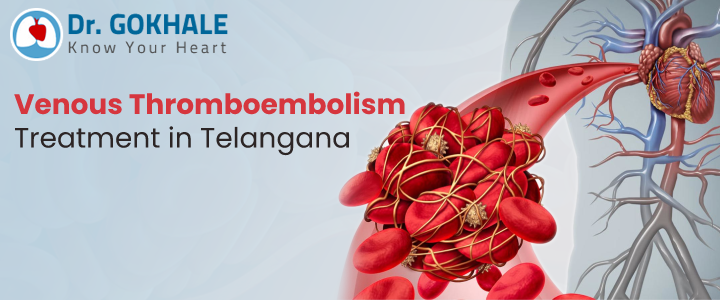After stroke and diagnosis, venous thromboembolism is the third most commonly vascular disease that affects millions of individuals around the world. It is medically represented by two events: Deep Venous Thrombosis (DVT) followed by Pulmonary Embolism (PE) – both these conditions together are called Venous Thromboembolism.
But what exactly do these medical terms mean? How does venous thromboembolism manifest m how does it impact and what is the treatment option? With the inputs from the best lungs specialist in Hyderabad, Dr Alla Gopala Krishna Gokhale, let us find out in this blog here:
What is Venous Thromboembolism?
Venous Thromboembolism is a medical condition where the blood clot that can happen in a deep vein (usually, leg, groin or thigh) travels to the lungs via circulation and results in blockage. The formation of a clot in the veins is called Deep Vein Thrombosis (DVT) and the blockage thus formed in the lungs is called Pulmonary Embolism (PE). Together they are termed Venous Thromboembolism a dangerous medical which can lead to disability or death when not identified in the early stages.
So what are the signs of Venous Thromboembolism?
The awareness of Venous Thromboembolism is painstakingly low when compared to other serious medical conditions. And this is why every individual must be aware of the warning signs that may potentially signal Venous Thromboembolism which is as follows:
Signs of Deep Vein Thrombosis
– Swelling in the foot or ankle, pain or tenderness in leg often triggering at calf, warmth or discolouration.
Signs of Pulmonary Embolism –
Rapid or short breathing, pain in the chest, rapid heartbeat, light-heartedness, fainting, and low blood pressure.
Some of the common signs are as above based on the stage of Venous Thromboembolism a patient may find himself in. However it must be noted that Venous Thromboembolism may not always show symptoms until complications occur, says Dr Alla Gopala Krishna Gokhale, the best lung transplant surgeon in India.
Diagnosis and treatment for Venous Thromboembolism:
Special tests and procedures are needed to be performed for diagnosing Venous Thromboembolism. While medications and stockings are prescribed for thrombosis to improve circulation, Pulmonary Embolism will need immediate attention in the form of medication or even surgery to resolve the blood clot.
Who is at more risk for Venous Thromboembolism?
Every individual is susceptible to Venous Thromboembolism but few conditions increase their risk of its incidence. So the risk factors of Venous Thromboembolism include:
- Surgeries or fractures that cause injuries to veins or muscles.
- Heart and lung diseases, cancer and its treatment.
- Family history of vein thrombosis or pulmonary embolism.
- Clotted disorders (inherited).
- Age and obesity
- Paralysis or long time confinement to bed.
- Inflammatory bowel diseases.
While Venous Thromboembolism is easy to treat when identifies early, most symptoms do not show up which makes it a serious condition. If you identify with any of the risk factors and experience symptoms mentions above we urge you to immediately consult a lung specialist as soon as possible. If you are from Hyderabad lung specialist and leading lung transplantation surgeon In India Dr Alla Gopala Krishna Gokhale can help you with consultation and treatment for Venous Thromboembolism in Hyderabad.














